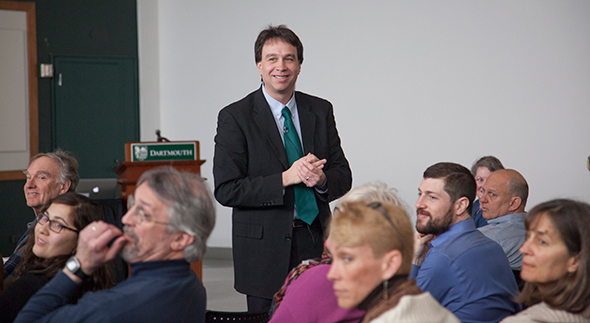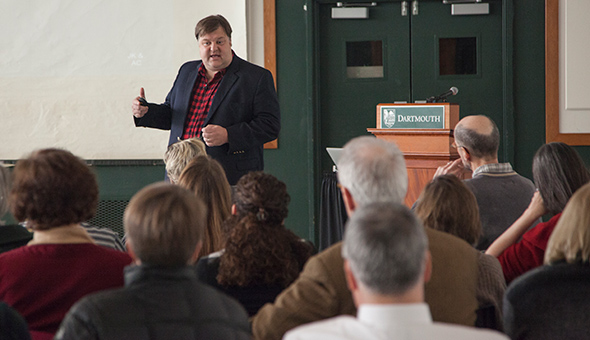
- About
- Consultation
- Programs
- Resources
- News & Events
Back to Top Nav
Back to Top Nav
Back to Top Nav
Dartmouth's effort to integrate a premier liberal arts education with new learning technology is nothing new. The College has been on the cutting edge of this work for 50 years, since President John Kemeny introduced BASIC programming language and the concept of "computing across the curriculum."

Josh Kim, director of digital learning initiatives and co-host of the session, takes a question from the audience. (Photo by Corinne Arndt Girouard)
During the third "Moving Dartmouth Forward" presentation, which focused on digital learning, Alan Cattier '86, director of academic and campus technology services and co-host of the session, described the College as a pioneer in learning technology from 1960 to the present day.
Some attendees asked if a focus on digital learning might dilute the faculty's close academic connection with undergraduates. Josh Kim, director of digital learning initiatives and co-host of the session, said at the center of all innovation at Dartmouth, the core commitment to a liberal arts education remains constant.
Read more:
"We're really thinking about technology from the learners' perspective," Kim said. "We think that everything we're doing here is about seeing the best type of learning at Dartmouth."
About 70 people attended the noontime discussion on Monday, March 3, in Alumni Hall. Each topic in the series, which is open to faculty, students, staff, and alumni, is presented in two sessions to allow for community-wide participation. The second of the digital learning conversations was scheduled for 6:30 to 7:30 p.m. on the ground floor of Fahey Hall.
Kim and Cattier are responsible for leading Dartmouth’s efforts to innovate with learning technologies and for helping faculty across the institution implement technology in support of their teaching goals. They are also heading up Dartmouth’s participation in edX, the nonprofit online learning platform founded by Harvard University and the Massachusetts Institute of Technology.
Dartmouth joined the massive open online course (MOOC) platform in January. Kim said Monday that Dartmouth students would not take classes through edX, but that the college's participation would inform the work of faculty as they develop internal digital resources for the classroom.

Alan Cattier '86, director of academic and campus technology services and co-host of the session, talks about Dartmouth’s participation in edX, the nonprofit online learning platform founded by Harvard and MIT. (Photo by Corinne Arndt Girouard)
Cattier said that edX, with the participation of 10,000 to 100,000 students per class, also offers valuable research possibilities using analytics. This data will inform Dartmouth's effort to understand what works and what doesn’t in digital pedagogy. Dartmouth students and faculty will use these lessons on the internal platform, Kim said.
Classrooms already integrate technology, digital content, reading, and other resources through the College's internal digital platform. This process will accelerate in the future, Cattier said, and participation in edX and other innovative digital resources will ensure that the College remains on the cutting edge.
"Can we afford not to do this?" Cattier asked, adding a quote from Shakespeare: "If it be not now, yet it will come—the readiness is all."
The “Moving Dartmouth Forward” series is designed to give community members an opportunity to discuss ideas related to the initiatives of President Phil Hanlon ’77, and to generate new ideas.
A video of the March 3 session is available on the Dartmouth YouTube channel. The video was also lived-streamed on YouTube. Members of the community can also join the discussion through the Improve Dartmouth website and can view videos of all the sessions through the "Moving Dartmouth Forward" web page of the Office of the President.
The “Moving Dartmouth Forward sessions will continue into the spring; each session will take place from 12-1 p.m., and again from 6:30-7:30 p.m. Below is the current schedule of the sessions, with presenters for each one. Future sessions will be added when available.
Presenters: Daniel Parish, director Dartmouth for Life
Roger Woolsey, director and senior assistant dean, Center for Professional Development
Presenters: Trip Davis, executive director of the Office of Entrepreneurship & Technology Transfer
Adrian Randolph, associate dean of the faculty for the arts and humanities and the Leon E. Williams Professor of Art History
Presenters: Lynn Higgins, associate dean of the faculty for international and interdisciplinary studies
Lindsay Whaley, associate provost for international initiatives